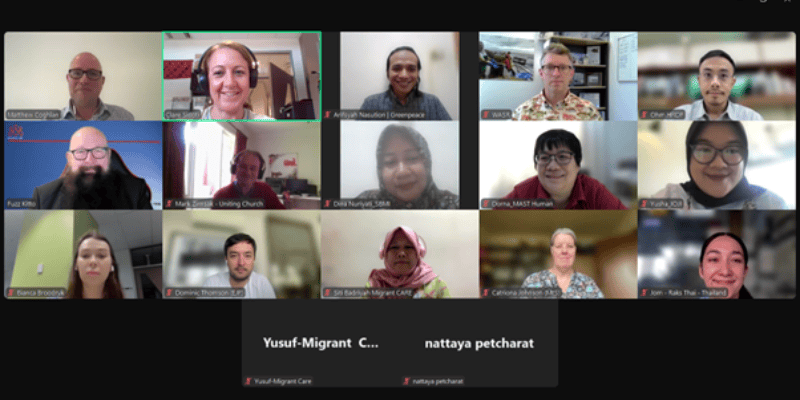
For the past five weeks, 14 NGOs from Australia, Indonesia and Thailand have met for a frank and open discussion and exchange concerning human trafficking and modern slavery in the fishing industry.
Human trafficking and modern slavery are severe human rights problems in the fishing industry in the ASEAN region. Domestic fishers in ASEAN waters and ASEAN migrant workers on East Asian fishing vessels have negligible legal protections during migration and at sea. They are particularly vulnerable to human trafficking and forced labour and often subject to extreme forms of coercion such as violence. As consumers of canned and frozen seafood products that result from this exploitation, the Australian public has limited awareness of the exploitative supply chain in fishing industry in the ASEAN region. This lack of awareness is a contributory factor in continuing abuse, as consumer and civil society organisation (CSO) action is a key driver of change. The program's participants brought a wealth of knowledge in anti-slavery, IUU, supply chains and migrant workers rights, which made for interesting and fruitful discussions.
In addition to building connections between the three countries, participants had the opportunities to hear from and engage with CSO and academic experts on the fisheries supply chain between ASEAN and Australia, UN agencies and regional donors on counter-trafficking and anti-slavery strategies and activities for the fishing industry, and Australia and ASEAN companies on their fishing industry risk assessments, responses and disclosure.
Participants were able to explore the key features of Indonesian, Thailand and Australian fishing industries and legal frameworks, export data from these two ASEAN countries to Australia, and the indicators and incidence of forced labour in the industries. They were informed about company human rights due diligence, national government labour inspections, civil society legal and social services, and ASEAN counter-trafficking and migrant workers’ rights commitments and institutions.
After hearing from the expert presenters, in the final week, participants came together and discussed some common issues they face in identifying and remedying human trafficking and modern slavery and explored ideas for collaborating to address them.
The Australian and ASEAN Civil Society Exchange on Human Trafficking and Modern Slavery in the Fishing Industry 2024 program was made possible with the support of a grant from the Australian Department for Foreign Affairs and Trade’s Australia-ASEAN Council and held in partnership with Migrant Forum in Asia.
DTP acknowledges the traditional custodians of the land on which we work, the Bedegal people of the Eora Nation. We recognise their lands were never ceded, and we acknowledge their struggles for recognition and rights and pay our respects to the Elders – past, present – and the youth who are working towards a brighter tomorrow. This continent always was and always will be Aboriginal land.
Aboriginal and Torres Strait Islander peoples should be aware that this website contains images or names of people who have passed away.
DTP acknowledges the traditional custodians of the land on which we work, the Bedegal people of the Eora Nation. We recognise their lands were never ceded, and we acknowledge their struggles for recognition and rights and pay our respects to the Elders – past, present – and the youth who are working towards a brighter tomorrow. This continent always was and always will be Aboriginal land.
Aboriginal and Torres Strait Islander peoples should be aware that this website contains images or names of people who have passed away.
Privacy Policy | Terms of Use | Disclaimer | Policies
© 2022 Diplomacy Training Program | ABN 31 003 925 148 | Web Design by Studio Clvr